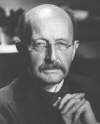 (source)
(source)
|
Max Planck
(23 Apr 1858 - 4 Oct 1947)
German theoretical physicist who introduced the quantum theory (1900), for which he was awarded the 1918 Nobel Prize for Physics. This assumes that energy is not infinitely subdivisible, but ultimately exists as discrete amounts he called quanta.
|
Max Planck Quotes on Knowledge (9 quotes)
>> Click for 71 Science Quotes by Max Planck
>> Click for Max Planck Quotes on | Absolute | Law | Nature | Research | Science | Thought | Truth |
>> Click for 71 Science Quotes by Max Planck
>> Click for Max Planck Quotes on | Absolute | Law | Nature | Research | Science | Thought | Truth |
A scientist is happy, not in resting on his attainments but in the steady acquisition of fresh knowledge.
— Max Planck
The Philosophy of Physics. Collected in The New Science: 3 Complete Works (1959), 253.
Hitherto the principle of causality was universally accepted as an indispensable postulate of scientific research, but now we are told by some physicists that it must be thrown overboard. The fact that such an extraordinary opinion should be expressed in responsible scientific quarters is widely taken to be significant of the all-round unreliability of human knowledge. This indeed is a very serious situation.
— Max Planck
In Max Planck and James Vincent Murphy (trans.), Where is Science Going?, (1932), 66.
Science does not mean an idle resting upon a body of certain knowledge; it means unresting endeavor and continually progressing development toward an end which the poetic intuition may apprehend, but which the intellect can never fully grasp.
— Max Planck
In The Philosophy of Physics (1936). Collected in The New Science: 3 Complete Works (1959), 290.
Science enhances the moral value of life, because it furthers a love of truth and reverence—love of truth displaying itself in the constant endeavor to arrive at a more exact knowledge of the world of mind and matter around us, and reverence, because every advance in knowledge brings us face to face with the mystery of our own being.
— Max Planck
In Max Planck and James Vincent Murphy (trans.), Where is Science Going?, (1932), 169.
Scientific discovery and scientific knowledge have been achieved only by those who have gone in pursuit of them without any practical purpose whatsoever in view.
— Max Planck
The New Science (1959), 93.
The atheist movement declares religion to be an arbitrary illusion—devised by power-hungry priests—for the pious belief in a higher Power over us. At this point, it is not surprising that the atheist movement describes religion with only words of mockery. The atheist movement eagerly makes use of the advance of scientific knowledge. In apparent unity with the progress of science, atheism accelerates its subverting action on the peoples of earth in all social classes. In short, after a victory by atheism, not only all the most precious wealth of our culture would topple, but—what is worse—the prospects for a better future also fade.
— Max Planck
This is a loose translation by Webmaster. It has been gently rephrased for clarity, from a passage in Religion und Naturwissenschaft, Vortrag Gehalten im Baltikum Mai 1937 (1958), 7. The passage in the original German is prolix. The original German version of this quote can be found, together with a closer translation, elsewhere on this web page, beginning: “Under these circumstances….”
The forces of nature, such as electricity for instance, were not discovered by men who started out with the set purpose of adapting them for utilitarian purposes. Scientific discovery and scientific knowledge have been achieved only by those who have gone in pursuit of it without any practical purpose whatsoever in view. … Heinrich Hertz, for instance, never dreamt that his discoveries would have been developed by Marconi and finally evolved into a system of wireless telegraphy.
— Max Planck
In Max Planck and James Vincent Murphy (trans.), Where Is Science Going? (1932), 138.
Under these circumstances, it is not surprising that the atheist movement—which declares religion to be an arbitrary illusion, devised by power-hungry priests, and for the pious belief in a higher Power over us—has nothing but words of mockery, eagerly makes use of the advancing scientific knowledge, and in apparent unity with it, accelerates its subverting action on the peoples of earth in all classes. I need not discuss here in any more detail, that after its victory, not only all the most precious wealth of our culture would topple, but—what is worse—the prospects for a better future.
— Max Planck
In Religion und Naturwissenschaft, Vortrag Gehalten im Baltikum Mai 1937 (1958), 7. Translated by Webmaster, using online resources, and modifying punctuation). For a more easily understood version, more loosely translated, see the quote on this page beginning: “The atheist movement….”
from the original German: “Unter diesen Umständen ist es nicht zu verwundern, wenn die Gottlosenbewegung, welche die Religion als ein willkürliches, von machtlüsternen Priestern ersonnenes Trugbild erklärt und für den frommen Glauben an eine höhere Macht über uns nur Worte des Hohnes übrig hat, sich mit Eifer die fortschreitende naturwissenschaftliche Erkenntnis zunutze macht und im angeblichen Bunde mit ihr in immer schnellerem Tempo ihre zersetzende Wirkung über die Völker der Erde in allen ihren Schichten vorantreibt. Daß mit ihrem Siege nicht nur die wertvollsten Schätze unserer Kultur, sondern, was schlimmer ist, auch die Aussichten auf eine bessere Zukunft der Vernichtung anheim fallen würden, brauche ich hier nicht näher zu erörtern.”
We are in a position similar to that of a mountaineer who is wandering over uncharted spaces, and never knows whether behind the peak which he sees in front of him and which he tries to scale there may not be another peak still beyond and higher up.
— Max Planck
In Max Planck and James Vincent Murphy (trans.), Where is Science Going?, (1932), 200.
See also:
- 23 Apr - short biography, births, deaths and events on date of Planck's birth.
- Where Is Science Going?, by Max Planck. - book suggestion.




 In science it often happens that scientists say, 'You know that's a really good argument; my position is mistaken,' and then they would actually change their minds and you never hear that old view from them again. They really do it. It doesn't happen as often as it should, because scientists are human and change is sometimes painful. But it happens every day. I cannot recall the last time something like that happened in politics or religion.
(1987) --
In science it often happens that scientists say, 'You know that's a really good argument; my position is mistaken,' and then they would actually change their minds and you never hear that old view from them again. They really do it. It doesn't happen as often as it should, because scientists are human and change is sometimes painful. But it happens every day. I cannot recall the last time something like that happened in politics or religion.
(1987) -- 


